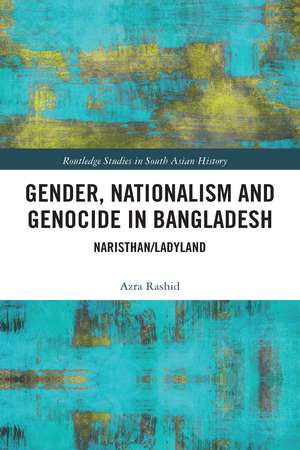Gender, Nationalism, and Genocide in Bangladesh: Naristhan/Ladyland: Routledge Studies in South Asian History
Autor Azra Rashiden Limba Engleză Paperback – 30 iun 2020
This book engages with the existing feminist scholarship on gender, nationalism and genocide to investigate the dominant representations of gender in the 1971 genocide in Bangladesh and juxtaposes the testimonies of survivors and national memory of that war to create a shift of perspective that demands a breaking of silence. The author explores and challenges how gender has operated in service of Bangladeshi nationalist ideology, in particular as it is represented at the Liberation War Museum. The archive of this museum in Bangladesh is viewed as a site of institutionalized dialogue between the 1971 genocide and the national memory of that event. An examination of the archive serves as an opening point into the ideologies that have sanctioned a particular authoring of history, which is written from a patriarchal perspective and insists on restricting women’s trauma to the time of war. To question the archive is to question the authority and power that is inscribed in the archive itself and that is the function performed by testimonies in this book. Testimonies are offered from five unique vantage points – rape survivor, war baby, freedom fighter, religious and ethnic minorities – to question the appropriation and omission of women’s stories. Furthermore, the emphasis on the multiplicity of women’s experiences in war seeks to highlight the counter-narrative that is created by acknowledging the differences in women’s experiences in war instead of transcending those differences.
An innovative and nuanced approach to the subject of treatment and objectification of women in conflict and post conflict and how the continuing effects entrench ideas of gender roles and identity, this book will be of interest to academics in the fields of South Asian History and Politics, Gender and genocide, Women and War, Nationalism and Diaspora and Transnational Studies.
| Toate formatele și edițiile | Preț | Express |
|---|---|---|
| Paperback (1) | 378.92 lei 6-8 săpt. | |
| Taylor & Francis – 30 iun 2020 | 378.92 lei 6-8 săpt. | |
| Hardback (1) | 885.83 lei 6-8 săpt. | |
| Taylor & Francis – 19 noi 2018 | 885.83 lei 6-8 săpt. |
Din seria Routledge Studies in South Asian History
-
 Preț: 317.08 lei
Preț: 317.08 lei -
 Preț: 318.09 lei
Preț: 318.09 lei -
 Preț: 416.22 lei
Preț: 416.22 lei -
 Preț: 410.66 lei
Preț: 410.66 lei -
 Preț: 380.63 lei
Preț: 380.63 lei -
 Preț: 389.38 lei
Preț: 389.38 lei -
 Preț: 412.57 lei
Preț: 412.57 lei - 19%
 Preț: 258.50 lei
Preț: 258.50 lei -
 Preț: 486.42 lei
Preț: 486.42 lei - 31%
 Preț: 767.20 lei
Preț: 767.20 lei -
 Preț: 412.27 lei
Preț: 412.27 lei -
 Preț: 384.09 lei
Preț: 384.09 lei -
 Preț: 412.57 lei
Preț: 412.57 lei - 12%
 Preț: 299.03 lei
Preț: 299.03 lei - 18%
 Preț: 1055.51 lei
Preț: 1055.51 lei -
 Preț: 405.87 lei
Preț: 405.87 lei - 18%
 Preț: 1057.75 lei
Preț: 1057.75 lei - 18%
 Preț: 1108.37 lei
Preț: 1108.37 lei - 28%
 Preț: 823.44 lei
Preț: 823.44 lei - 20%
 Preț: 259.98 lei
Preț: 259.98 lei -
 Preț: 386.22 lei
Preț: 386.22 lei - 18%
 Preț: 1001.84 lei
Preț: 1001.84 lei - 18%
 Preț: 703.79 lei
Preț: 703.79 lei - 18%
 Preț: 1105.24 lei
Preț: 1105.24 lei -
 Preț: 481.05 lei
Preț: 481.05 lei - 18%
 Preț: 885.83 lei
Preț: 885.83 lei - 18%
 Preț: 996.96 lei
Preț: 996.96 lei - 14%
 Preț: 338.33 lei
Preț: 338.33 lei -
 Preț: 417.96 lei
Preț: 417.96 lei -
 Preț: 389.38 lei
Preț: 389.38 lei - 5%
 Preț: 850.53 lei
Preț: 850.53 lei
Preț: 378.92 lei
Nou
Puncte Express: 568
Preț estimativ în valută:
72.50€ • 75.71$ • 59.87£
72.50€ • 75.71$ • 59.87£
Carte tipărită la comandă
Livrare economică 15-29 aprilie
Preluare comenzi: 021 569.72.76
Specificații
ISBN-13: 9780367583163
ISBN-10: 036758316X
Pagini: 150
Dimensiuni: 138 x 216 x 10 mm
Greutate: 0.2 kg
Ediția:1
Editura: Taylor & Francis
Colecția Routledge
Seria Routledge Studies in South Asian History
Locul publicării:Oxford, United Kingdom
ISBN-10: 036758316X
Pagini: 150
Dimensiuni: 138 x 216 x 10 mm
Greutate: 0.2 kg
Ediția:1
Editura: Taylor & Francis
Colecția Routledge
Seria Routledge Studies in South Asian History
Locul publicării:Oxford, United Kingdom
Public țintă
PostgraduateCuprins
1. Introduction 2. Historical Background 3. Gender, Nationalism and Genocide 4. Archives, Museums and the Politics of Representation 5. Stories of Resistance 6. Conclusion
Notă biografică
Azra Rashid is a filmmaker and postdoctoral fellow in the Department of Gender & Cultural Studies at the University of Sydney, Australia. Her research is focused on representations of gender in the existing discourses of nationalism and genocide.
Descriere
This book engages with the existing feminist scholarship on gender, nationalism and genocide to investigate the dominant representations of gender in the 1971 genocide in Bangladesh and juxtaposes the testimonies of survivors and national memory of that war to create a shift of perspective that demands a breaking of silence.
